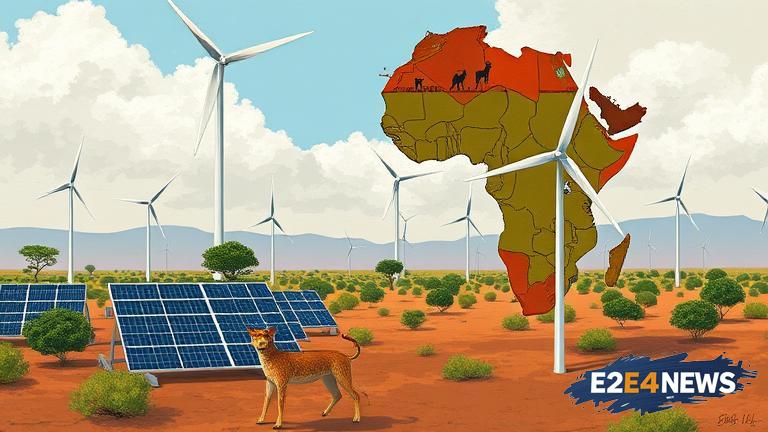The African continent is witnessing a significant shift towards renewable energy, driven by the need to address the pressing issues of energy access, climate change, and sustainable development. With many countries still struggling to provide electricity to their populations, renewable energy has emerged as a viable solution. Solar and wind power are becoming increasingly popular, with countries like South Africa, Egypt, and Morocco leading the way. The cost of renewable energy technologies has decreased dramatically over the years, making them more competitive with fossil fuels. This has led to a surge in investment in the sector, with many international companies and organizations committing to support Africa’s renewable energy ambitions. The African Union’s Agenda 2063 has set a target of ensuring access to clean and affordable energy for all Africans by 2030. To achieve this, the continent will need to increase its renewable energy capacity significantly. Several countries have already made significant progress in this regard, with Kenya, for example, generating over 70% of its electricity from renewable sources. The use of renewable energy is not only reducing Africa’s carbon footprint but also creating new economic opportunities and jobs. The renewable energy sector is expected to create over 20 million new jobs globally by 2030, with Africa being a major beneficiary. However, despite the progress made, there are still significant challenges to be addressed, including the lack of infrastructure, financing, and regulatory frameworks. To overcome these challenges, African countries will need to work together and with international partners to develop the necessary policies and frameworks. The private sector will also play a critical role in driving the growth of the renewable energy sector. Companies like Vestas, Siemens Gamesa, and Goldwind are already investing heavily in Africa’s renewable energy market. The African Development Bank has also launched several initiatives to support the development of renewable energy in Africa, including the Desert to Power program, which aims to develop 10 GW of solar power in the Sahel region. The program is expected to provide electricity to over 250 million people and reduce carbon emissions by 350 million tons. Other international organizations, such as the International Renewable Energy Agency (IRENA) and the United Nations Environment Programme (UNEP), are also providing support to Africa’s renewable energy sector. In addition to the economic and environmental benefits, renewable energy is also improving the health and well-being of Africans. By reducing air pollution from fossil fuels, renewable energy is helping to prevent premature deaths and respiratory diseases. Furthermore, renewable energy is also enhancing energy security and reducing dependence on imported fuels. As the demand for energy continues to grow, Africa’s renewable energy sector is poised for significant growth, with the potential to become a major player in the global energy market. The future of Africa’s energy sector looks bright, with renewable energy at the forefront of the continent’s development agenda. With the right policies, investments, and partnerships, Africa can unlock its vast renewable energy potential and achieve a sustainable energy future. The benefits of renewable energy are numerous, and it is essential that African countries continue to prioritize the development of this sector. By doing so, they can ensure a brighter future for their citizens and contribute to a more sustainable and equitable world.
